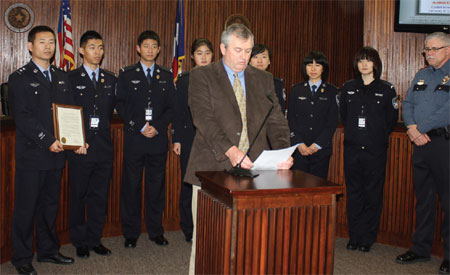Chinese cop cadets learn about US police work
Updated: 2014-04-17 11:21
By May Zhou in Houston (China Daily USA)
|
||||||||
|
|
"We know that we are teaching the future leaders of China, and we take the responsibilities very serious," said Professor Phillip Lyons of the Department of Criminal Justice and Criminology at Sam Houston State University (SHSU) in Huntsville, a small town on the outskirts of Houston.
Lyons was talking about the 20 police cadets from Zhejiang Police College (ZPC) who are undergoing a one-year study program at SHSU in Huntsville, a small town on the outskirts of Houston.
As part of a collaborate program between the two universities, ZPC has been sending its top students to SHSU to study for one year for the past five years, according to ZPC faculty member Feng Sibo, who is overseeing the trainees for the 2013-2014 exchange program.
"The students are selected after a few rounds of rigorous selection process and interviews, and they are the best among the best," he said. "The selected students come to SHSU to study for three semesters and upon successful completion of their college education, each will earn dual degrees: public order from ZPC and criminal justice from SHSU."
Amanda Burris, assistant to the dean and supervisor of the exchange program at SHSU, said it started eight years ago as a simple certificate program with professors from SHSU teaching at ZPC and evolved into the current incorporated dual-degree program. So far, SHSU has sent three students to ZPC to study Chinese policing, culture, martial arts and language.
Besides their academic study, she said the trainees are heavily involved in extracurricular activities such as sports and volunteering for Habitat for Humanity projects to get to know US culture. "We get to know them on a personal level, and through them we learn the Chinese cultures, values important to them and learn about China as a country," she said.
Lyons, who has had police experience, has taught at ZPC twice since 2007 and has been coordinating the cadets' internship at SHSU since the program started.
Feng explained that the cadets have been doing internship with the Alvin Police Department (APD) and the League City Police Department (LCPD) and this year some cadets started internships with the Houston Police Department (HPD).
Feng said the internships were done during the winter break in January this year. Each student was assigned to a local police officer of the HPD or the APD to learn firsthand how US policing works.
Lyons said he is considering offering more opportunities for the students to visit big and small police departments.
Burris and Lyons consider the trainees "exceptional" and said they outperform the US students academically.
"We recognize the students are poised to become leaders in China 20 years from now. Just by having the opportunity to see other police model and adapt that to whatever they need, by seeing how other people live will serve them well in policy making," Lyons said.
Cadet Lin Ling said she enjoyed the class discussion and active participation very much, and found the US judicial review system to be very important to ensure justice.
Cadet Wang Jingqiu said he was impressed by the sophistication of US criminology: "A lot of research has been done in this field to study why crimes happen and how the social structure impact crime."
Wang, who interned with the HPD, said:
"The crime rate seemed high in the big city. The patrol police were busy dealing one case after another with little break in between. The model is different from China. In Houston, patrol cars are constantly moving 24 hours a day; in China, we have police stations deployed throughout the communities. The Houston model has more mobility."
Cadet Xu Lifeng interned with the APD and was very impressed by the well-equipped police patrol car: "The police can check a person's criminal record from the computer in the car right at scene. I am also impressed by how other drivers quickly give way to police very orderly when situation demands. People here normally don't like police yet when they need help they turn to police."
To Feng, these well-educated and well experienced cadets represent the new generation of Chinese police.
mayzhou@chinadailyusa.com
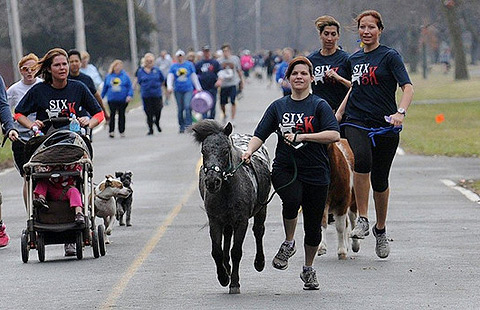
 Runners and their 4-legged friends race in New York
Runners and their 4-legged friends race in New York
 Top 10 Chinese Internet firms eyeing IPOs in US
Top 10 Chinese Internet firms eyeing IPOs in US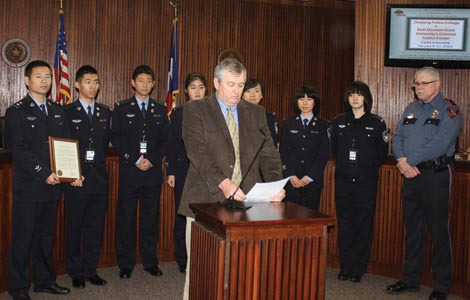
 Chinese cop cadets learn about US police work
Chinese cop cadets learn about US police work
 In Boston, warming up for, remembering marathon day
In Boston, warming up for, remembering marathon day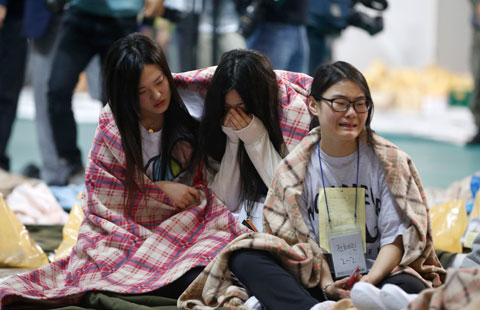
 Families of missing passengers face agonising wait
Families of missing passengers face agonising wait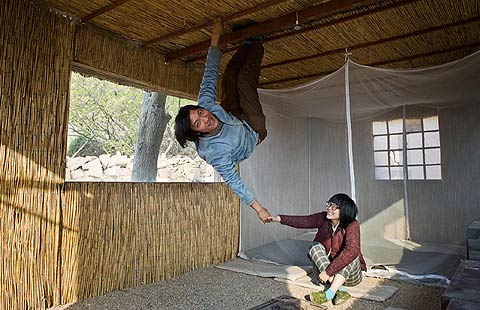
 Couple leave the city for 'Self-sufficiency Lab'in mountains
Couple leave the city for 'Self-sufficiency Lab'in mountains
 Turning waste into something valuable
Turning waste into something valuable
 Dignitaries put their foot down
Dignitaries put their foot down
Most Viewed
Editor's Picks

|

|

|

|

|

|
Today's Top News
4th US Navy official charged in bribery scheme
Chinese cop cadets learn about US police work
Sellers making clear profits on Google Glass
S Korean ferry's captain under probe
Texas seizes polygamist group's secluded ranch
Colombian novelist Garcia Marquez dies age 87
Economic growth drops to 7.4%
Pulitzers spotlight Snowden
US Weekly

|

|
